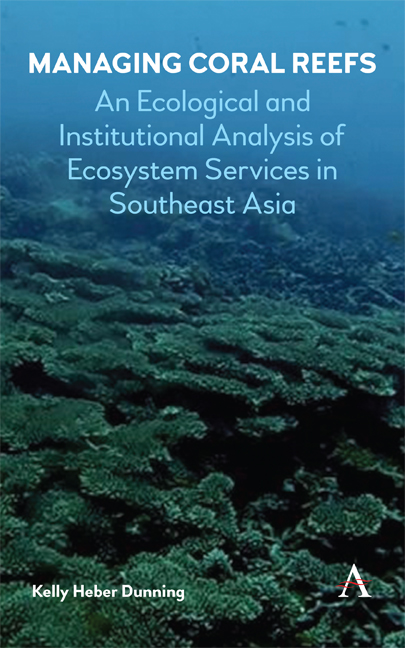 Managing Coral Reefs
Managing Coral Reefs Book contents
- Frontmatter
- Contents
- List of Figures
- List of Tables
- Acknowledgments
- List of Abbreviations
- 1 Introduction
- 2 Theory, Practice and Policy Context of Coral Reef Management
- 3 Governing Natural Resources in Indonesia and Malaysia
- 4 Case Study Sites and the Coral Triangle
- 5 Integrated Management of Marine Protected Areas
- 6 Legitimate Marine Protected Areas
- 7 Adaptive Capacity of Marine Protected Areas
- 8 Policy Recommendations for Marine Protected Area Management in Developing Countries
- Appendix A Research Design
- Appendix B Data and Methods
- Appendix C Coral Cover Results
- References
- Index
7 - Adaptive Capacity of Marine Protected Areas
Published online by Cambridge University Press: 16 August 2018
- Frontmatter
- Contents
- List of Figures
- List of Tables
- Acknowledgments
- List of Abbreviations
- 1 Introduction
- 2 Theory, Practice and Policy Context of Coral Reef Management
- 3 Governing Natural Resources in Indonesia and Malaysia
- 4 Case Study Sites and the Coral Triangle
- 5 Integrated Management of Marine Protected Areas
- 6 Legitimate Marine Protected Areas
- 7 Adaptive Capacity of Marine Protected Areas
- 8 Policy Recommendations for Marine Protected Area Management in Developing Countries
- Appendix A Research Design
- Appendix B Data and Methods
- Appendix C Coral Cover Results
- References
- Index
Summary
Overview
The previous chapter discussed the significant differences in perceptions on legitimacy. Whereas stakeholders in co-managed settings attributed high degrees of legitimacy to institutions, the opposite was true for stakeholders in top-down marine parks. This chapter discusses the final set of differences in stakeholder perceptions: adaptive capacity. Stakeholders in co-managed settings felt that they were better able to learn and change management strategies when the need arose. In this section, a major component of the definition of adaptive capacity is organizational learning. Organizational learning is how a marine protected area (MPA) acquires understanding, know-how, techniques and practices. The actions of individuals are very important in a dialectical sense, because their own learning feeds the organization's learning just like the organization itself impacts the ability of individuals within it to learn. The result of learning in adaptive capacity must be innovation, or the crafting of improvements based on learning.
Much like in the previous chapters, I will present two hypothetical cases, Case A where there is anMPA with adaptive capacity and Case B where there is not. Beginning with Case A, stakeholders in this MPA frequently talk about man-made environmental degradation that troubles their local reefs, but they also talk about examples of how thesemistakes were fixed in the past and in the present. For example, stakeholders discuss rule breakers who fish for snappers and groupers under the cover of darkness and strip these important ecological functional groups off the reef. Once it became clear, through people reporting this behavior to the MPA leaders and members, action was taken to increase surprise patrols on the reef at night. Violators were caught and forced to pay fines. If they were caught again, they were reported to the police. The village is small, so night patrols could be funded through extra fees paid by hotels and dive shops. In addition, the small size of the village makes it so that offenders are largely known and personally asked to stop rule breaking by friends and neighbors working for the MPA.
- Type
- Chapter
- Information
- Managing Coral ReefsAn Ecological and Institutional Analysis of Ecosystem Services in Southeast Asia, pp. 121 - 144Publisher: Anthem PressPrint publication year: 2018


